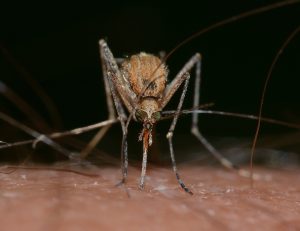 The West Nile Virus is a common mosquito borne disease throughout the United States. It has been found throughout the continental United States and is not just contained to one region or area. It affects birds, and often the birds will die once they become infected. This is one of the signs that the West Nile virus is active in the area.
The West Nile Virus is a common mosquito borne disease throughout the United States. It has been found throughout the continental United States and is not just contained to one region or area. It affects birds, and often the birds will die once they become infected. This is one of the signs that the West Nile virus is active in the area.
How Does the West Nile Virus Affect People?
According to the CDC, most people do not have any symptoms when they contract the West Nile virus. However about twenty percent of people who catch it end up with a fever. They may have additional symptoms include achy joints, a headache, nausea and vomiting or a rash. About 1 in 150 of people end up developing more serious complications that can cause meningitis and encephalitis.
What Is the Treatment Plan for West Nile Virus?
Currently there is no specific treatment for the West Nile virus. Instead, medical professionals will manage the symptoms. They will need to closely monitor the patient if they develop meningitis or encephalitis. They will work to mitigate the symptoms and to prevent further complications from the disease.
How is the West Nile Virus Spread?
The West Nile virus is primarily spread by mosquitoes. A person who handles a bird that has died from West Nile virus is not likely to contract the disease. However, there is the possibility of contracting it if you eat an infected bird. You need to be bitten by a mosquito that is carrying it. However, it can be passed in other ways as well. A human can contract the West Nile virus through a blood transfusion, organ transplant, or through lab exposure. A mother can pass it do her child during pregnancy, childbirth or by nursing.
Do I Need to Worry About the West Nile Virus?
The West Nile Virus is prevalent throughout the United States. However, it does not have a negative impact on the majority of people who contract it. If you are exhibiting symptoms of the West Nile virus, especially the more serious ones you should contact your medical provider immediately. They can help you deal with the symptoms and monitor you. There is currently no vaccination to prevent contracting the disease.
How Can I Prevent Myself or My Family Members from Contracting the West Nile Virus?
The best way to avoid contracting the West Nile virus is to avoid being bitten by mosquitoes. One way to do this is to use an effective bug repellent. DEET is the most effective insect repellent on the market. It is important to use this anytime that you are exposed to mosquitoes. If you do not want to worry about using mosquito repellent every time you go into your yard, you should consider getting professional mosquito control treatments. These can virtually eliminate all of the mosquitoes in your yard and allow you and your family to enjoy it without worrying about mosquitoes. Contact Mosquito Tek today to learn more about the different options available.
For more information about mosquito control: https://virginia-beach.mosquitofreeliving.com/services/mosquito-control/
Comments
Post a Comment